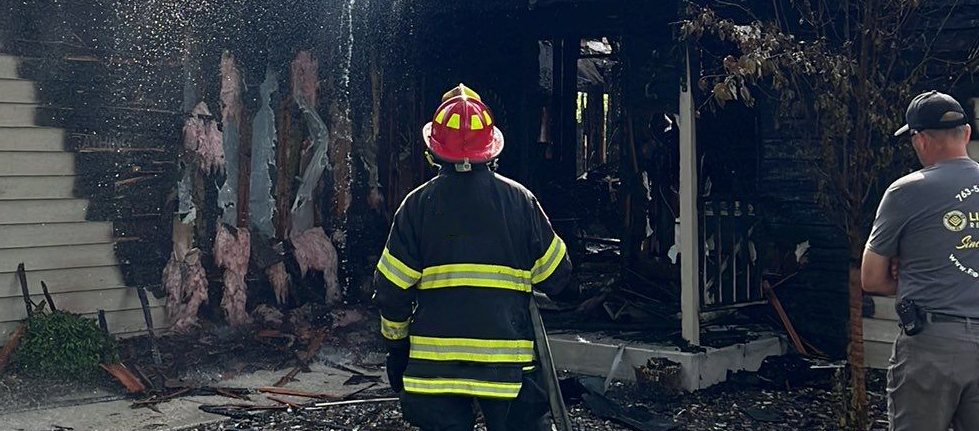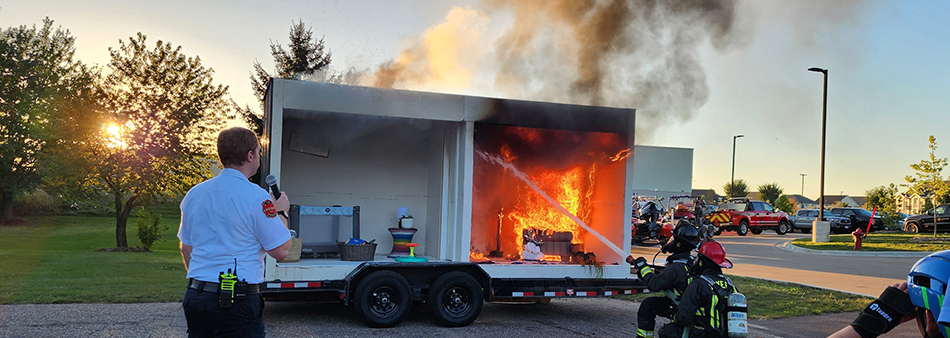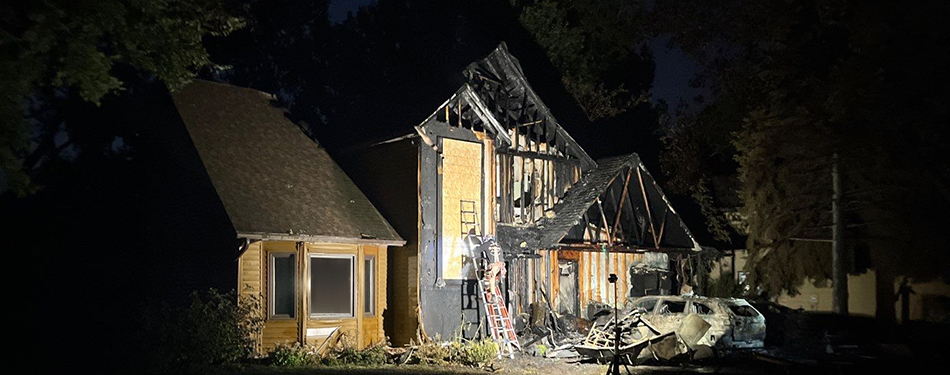At Lindstrom Restoration, we work very closely with local fire departments. Over 20 local fire departments recommend us (and a few other outstanding contractors) to board up houses at all hours of the day. Since most of the public has thankfully never experienced a fire, they don’t know that by law, once a fire occurs in a house or business, it must be boarded up immediately to prevent subsequent dangers to others. It’s called an attractive nuisance. Kids are drawn to burnt buildings by curiosity, and certainly potential thieves are a problem.
People are also unaware that a fire department member cannot leave the scene of a fire until the building is boarded up and made secure. Imagine at 3 AM, being a home or business owner and being told after suffering a traumatic fire, that they are responsible for having their property secured promptly without delay? Who do people turn to? This is why fire departments refer trusted and vetted contractors who specialize in this work like Lindstrom Restoration. Our on-call team rushes out to the site within minutes to professionally and quickly secure the property, including windows and the roof from any further damage from the elements. Entry points are boarded up and locked.

Unfortunately, some unscrupulous companies monitor public first responder scanners to learn of fires and show up uninvited. These “ambulance chasers,” as people call them, are not necessarily there to board up. They are more interested in the resulting restoration and reconstruction business. Some pressure people to sign contracts on the spot. Fire Departments don’t like these contractor operators who sometimes impede their efforts to put out the fire. They also don’t want people high-pressuring owners who are already psychologically compromised from a traumatic event. Lindstrom Restoration understands that people are in no shape to entertain sales pitches after a horrific event. We give them our information and contact them the next day when they’ve had time to absorb what’s transpired and have a clearer head.
Firefighters are our heroes at Lindstrom. They risk their lives to help save our properties and sometimes the lives of our family members and pets. They respond night and day. For that, many suffer physically and psychologically. While they have excellent equipment to fight fires safely, the chemicals they encounter are dangerous. The tragedies they inevitably confront are psychologically scarring. Some have their health compromised. Sadly, most of the public is unaware that oftentimes financial help and resources are limited for the personal heath damage they endure.
The Minnesota Firefighter Initiative (MnFIRE) was created by a former Minnesota fire chief to assist firefighters who need both financial and other resources to help with their recoveries. Since its inception in 2016, MnFIRE has been dedicated to providing Minnesota’s firefighters with the resources they need to prioritize and protect their health. The statewide advocacy organization focuses on the three health problems most commonly experienced by those in the fire service: cardiovascular disease, emotional trauma, and cancer. Lindstrom Restoration is a big supporter of this very worthwhile organization. As we have seen in recent years, the lives of first responders are in constant danger. They and their families need our support. We invite you to check out their website and consider offering any financial support you can.

This brings us to Fire Prevention Month this October. Most fire departments have open houses sometime during the year, but many do so in October since that is traditionally the beginning of the “fire season.” During the colder months, we all spend increased time indoors. More cooking and candle lighting occurs plus other risks increase during the fall and winter months. We discuss this below. We encourage you to increase your knowledge of reducing your fire risk by attending these open houses in your local communities. Firefighters make them a fun learning experience for the entire family. Departments open their stations so that the entire family can see everything upfront and close. There is free food and drink, and it’s a great way to spend a night or afternoon. Lindstrom Restoration participates in many of these open houses with a live burn demonstration trailer (as pictured above) to dramatically illustrates the safety value of closing doors when the family is either asleep or away from home.
Fires can be devastating, causing severe damage to property and endangering lives. Fortunately, many fires are preventable by taking care and proactive measures. Here are some essential fire prevention tips that can help keep your home or workplace safe from potential fire hazards.
1. Install Smoke Alarms
- Function: Smoke alarms are your first line of defense in alerting you to a fire. They detect smoke and give you time to escape.
- Tip: Install smoke alarms in every bedroom, outside each sleeping area, and on every level of your home.
- Maintenance: Test them monthly, replace the batteries at least once a year, and replace the entire unit every 10 years.
2. Create an Escape Plan
- Plan: Work out at least two ways to exit each room in case of a fire.
- Drills: Practice fire drills with your family or coworkers twice a year so everyone knows how to respond quickly.
- Meeting Spot: Identify a safe meeting spot outside the building where everyone can gather after escaping.
3. Avoid Overloading Electrical Circuits Especially When Using Chargers
- Risk: Overloaded electrical circuits can overheat and cause fires.
- Tip: Use one high-wattage appliance per outlet and avoid plugging multiple devices into the same outlet.
- Inspection: Check cords regularly for signs of wear or damage, and replace them if necessary.
- Monitor: Make sure chargers are being properly used and not overloading circuits. Laptop batteries should never be buried under covers when people are using them in bed or on couches with blankets. Use chargers properly and within manufacturer’s specifications and instructions.
4. Use Appliances Safely
- Heating Devices: Space heaters, irons, and other heating appliances should be turned off and unplugged when not in use.
- Kitchen Safety: Stay in the kitchen while cooking, and never leave a stove unattended, especially when using high heat or frying. Unplug coffee makers and toasters when not in use. Use microwaves responsibly. Sometimes people punch in 20 minutes when 2 were intended. Never store anything on a stove even if it has not been turned on. Keep pets away from stoves that can be turned on by touch. Many animals have started fires by jumping up on and activating push-button stoves.
- Dryers: Clean the lint trap before every load and inspect the venting system for blockages, which can cause overheating.
- Bathroom Fans: These get clogged and full of pet hair and other debris. Clean or blow them out at least twice a year.
5. Proper Storage of Flammable Materials
- Fuel and Chemicals: Store gasoline, paint, and other flammable liquids in approved containers and keep them in well-ventilated areas.
- Safe Distance: Keep these items away from heat sources such as furnaces, heaters, or direct sunlight.
- Dispose Properly: Oil-soaked rags should be placed in metal containers or kept outside, where they cannot smolder and start a fire. Ashes in fireplaces should go into metal containers. Embers can last for many days.
6. Careful Use of Candles
- Positioning: Keep candles at least 12 inches away from anything flammable (curtains, papers, etc.).
- Unattended Flames: Never leave a room with a candle burning. Consider using flameless candles as a safer alternative.
- Stability: Place candles on sturdy, non-flammable surfaces and in holders that won’t tip over.
7. Inspect and Maintain Heating Equipment
- Furnace Maintenance: Have your heating system inspected annually by a professional to ensure it’s working safely.
- Fireplace Safety: If you use a fireplace, ensure chimneys are cleaned at least once a year to prevent creosote buildup, which is a major fire hazard.
- Space Heaters: Keep space heaters at least 3 feet away from anything that can burn, and never use them as a drying rack.
8. Install Fire Extinguishers
- Placement: Place fire extinguishers in key areas like the kitchen, garage, and workshop.
- Training: Ensure everyone knows how to use a fire extinguisher. Remember the acronym PASS: Pull the pin, Aim low, Squeeze the handle, and Sweep the nozzle from side to side.
- Maintenance: Regularly check the pressure gauge to ensure the extinguisher is fully charged.
9. Avoid Smoking Indoors
- Safety Tip: If you smoke, smoke outside. Dispose of cigarette butts in a sturdy, non-flammable container filled with sand or water.
- Fire Risk: Many house fires start from smoking materials, especially when people fall asleep with a lit cigarette.
10. Be Cautious with Outdoor Grills, Fryers, and Even Peat Moss Planters
- Distance: Grills and fryers should be kept at least 10 feet away from buildings, deck railings, and overhanging branches. Never use turkey fryer indoors, not even an open garage.
- Supervision: Never leave a grill unattended while in use, and keep children and pets at a safe distance.
- Propane Tanks: Check propane connections for leaks before using the grill.
- Peat Moss Planters and Barrels: Peat moss, which is used in planters, pots, and barrels, can burn when very dry. Never toss cigarette butts, matches, or anything flammable into them.
11. Watch for Wildfire Risks (If Applicable)
- Clear Perimeter: If you live in an area prone to wildfires, create a defensible space around your home by clearing dry vegetation.
- Fire-Resistant Materials: Use fire-resistant materials for roofing and siding when building or renovating your home.
- Evacuation Plan: Stay informed about wildfire risks and have a plan for evacuating if necessary.

Conclusion
Get to know your local fire departments and all the great resources they provide. Support our first responders if you are financially able to do so. They are paid by taxpayer funds, which are limited. Our professional men and women need our support. Be aware of fire risks. Fire prevention is about awareness and action. By implementing these fire safety tips, you can significantly reduce fire risk in your home or workplace. Regular maintenance, cautious behavior, and planning ahead are the keys to keeping everyone safe.
Be vigilant and make fire safety a priority. When a fire occurs, seconds are crucial. Keep your bedroom doors shut at night to prevent fires from spreading rapidly, and have a fire ladder in your bedrooms on upper floors in case that is the only way out. Store gunny sacks to secure pets who may be sleeping with you. They will panic in fires and run away. If they are contained in sacks you can make sure they will be safe when exiting a burning building. Have a vetted fire restoration contractor in your cell phone contacts in case an emergency occurs. Save that, work with insurance agents who can recommend reliable vendors who respond fast to emergencies. Let’s all stay safe!


Leave a Reply